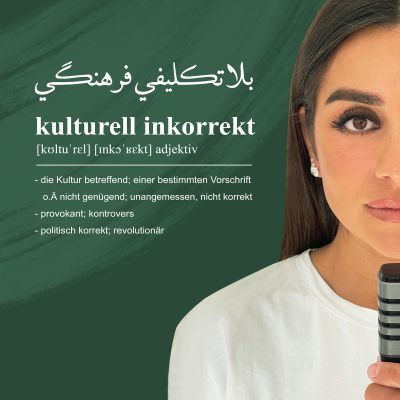The initiative Kulturell Inkorrekt / Culturally Incorrect was founded by me in January 2021. The goal of Kulturell Inkorrekt/Culturally Incorrect is to share knowledge and concrete call to actions on the topic of intercultural competence, also clarifying prejudices and myths about other cultures, creating more awareness about intercultural communication and providing knowledge about business and culture. How do we deal with societal standards & our traditions? How do we train intercultural competences? How to empower migrant kids who feel stuck between two cultures - if they have two homelands? And can I as a migrant kid be more successful in business with the right mindset? This podcast is culturally incorrect - so please don't be shocked if you will find culturally incorrect statements and status-quo opinions, therefore it is a podcast to give you another perspective on these important topics. This podcast is always available in english and in german. Please refer to the chapter marks within the episode if you want to switch to the specific language. - Die Initiative Kulturell Inkorrekt wurde im Januar 2021 von mir gegründet...
https://www.kulturellinkorrekt.com/
episode 43: #41 Why you have to create habits to make inclusion work
Warum wir Gewohnheiten schaffen müssen, damit Inklusion funktioniert
Deutsche Version: 42 Min.
Habits are a big part of our identity - 50-60% of our behavior is caused by our habits. In reality, our brain is really lazy. That's why we need habits to "survive the day", without investing too much time in deciding and/or doing things. But what about Diversity & Inclusion & Habits? How can habits "strengthen" prejudices, biases, and/ or discrimination? How can I acquire habits that make me think and act more inclusive?
That's why I invited Franz Kubillum, a former schoolmate of mine, who is really interested in the topic of habits. I asked him (a lot):
1) What habits are 2) If you can learn & train them 3) What good habits & bad habits are 4) How you can overcome bad ones 5) … And how habits may strengthen prejudices, bias and / or discrimination and of course - how to change them into good ones
Further links to Franz profiles: YouTube: https://www.youtube.com/c/Kubbillum LinkedIn: https://www.linkedin.com/in/franz-kubbillum/ Instagram: https://www.instagram.com/kubbillum/ Business e-mail: kubbillumf@gmail.com
41 Warum wir Gewohnheiten schaffen müssen, damit Inklusion funktioniertGewohnheiten sind ein wichtiger Teil unserer Identität - 50-60 % unseres Verhaltens sind auf unsere Gewohnheiten zurückzuführen. In Wirklichkeit ist unser Gehirn total faul. Deshalb brauchen wir Gewohnheiten, um "den Tag zu überstehen", ohne zu viel Zeit in Entscheidungen und/oder Handlungen zu investieren. Aber was ist mit Diversity & Inclusion und Gewohnheiten? Wie können Gewohnheiten Vorurteile, Voreingenommenheit und/oder Diskriminierung "stärken"? Wie kann ich mir Gewohnheiten aneignen, die mich inklusiver denken und handeln lassen?
Dafür habe ich Franz Kubillum eingeladen, einen ehemaligen Schulkameraden von mir, der sich sehr für das Thema Gewohnheiten interessiert. Ich habe ihn gefragt:
1) Was Gewohnheiten sind 2) Ob man sie lernen & trainieren kann 3) Was gute und schlechte Gewohnheiten sind 4) Wie man schlechte Gewohnheiten überwinden kann 5) … Und wie Gewohnheiten Vorurteile, Voreingenommenheit und/oder Diskriminierung verstärken können und natürlich - wie man sie in gute Gewohnheiten umwandelt
Wichtig Links zu Franz: YouTube: https://www.youtube.com/c/Kubbillum LinkedIn: https://www.linkedin.com/in/franz-kubbillum/ Instagram: https://www.instagram.com/kubbillum/ Business e-mail: kubbillumf@gmail.com
